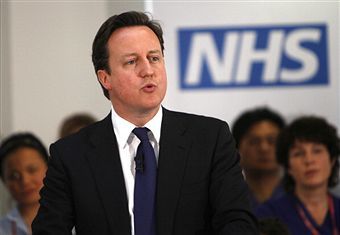 David Cameron is at his best when his back is to the wall. His speech on the NHS was largely as expected – a charm offensive designed to appease his warring coalition and reassure a fevered
public. I’ll wager that he has succeeded; but reservations and pitfalls remain.
David Cameron is at his best when his back is to the wall. His speech on the NHS was largely as expected – a charm offensive designed to appease his warring coalition and reassure a fevered
public. I’ll wager that he has succeeded; but reservations and pitfalls remain.
Cameron recognises that competition is the stiking point for most Liberal Democrats, while the Tories insist on it. Competition will stay. He said, “New providers, more choice and competition raises standards and delivers value for money.” However, competition will not be unbridled. Cameron reassured doubters, “But let me clear, no: we will not be selling off the NHS, we will not be moving towards an insurance scheme.”
So far, so good – in terms of the coalition at least. Now to reassure the country that he can be trusted to deliver reform. The national element of the health service will be preserved, while “people will have the power to drive change in the NHS in their area through transparency, choice and competition” in what he termed a “race for excellence”. GPs and other producers will be responsible for commissioning and providing services. Monitor will integrate these services to ensure that competition operates effectively. All of these services will be transparent; answerable to the communities they serve.
Cameron concedes that transparency is worthless without accountability. Commissioning will not be the preserve of GPs, as Lansley originally hoped. Cameron introduced ‘clinical senates’, where healthcare professionals and other interests (presumably care and health workers in the community and perhaps councillors) will run what is now being called ‘clinically-led commissioning’. The NHS Commissioning Board will then regulate all commissioning and it will answer to the secretary of state; it will also be given control of the deadline for commissioning.
This is where Cameron may get into trouble with Tory backbenchers. ‘Clinical senates’ will shift responsibility for commissioning away from GPs and towards other interests; and there may be a fear that too many cooks will spoil the broth, especially if politically motivated and largely unaccountable councils are involved. Then, giving ultimate responsibility for commissioning to the GP Commissioning Board suggests that power remains in the hands of the state, not consumers. This raises doubts about the extent of competition: the primary aim of reform.
Essentially, Andrew Lansley’s most recognisable objectives appear to have been dropped to placate the Liberal Democrats and various vested interests. However, of all Cameron’s enemies
on this issue, the backbench Tories are probably the least threatening. Cameron may have done enough to save the reforms on which he wants to be held “personally responsible“.






Comments